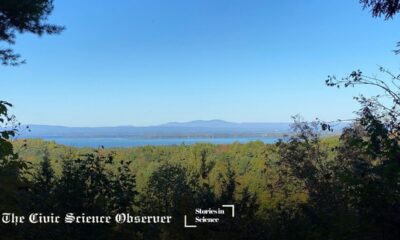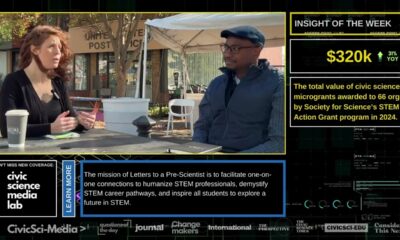Stories in Science Special Series
Swimming in the Sea of Mysteries

– Hyunseung Hong –
[dropcap]F[/dropcap]or as long as I can remember, my scientific pursuits have given me the eyes to see and understand the world around me. I was intrigued by science because it allowed me to better understand how my body worked. Ergo, it mattered and made sense for me to pursue studies in science. I was drawn to courses that allowed me to develop an intuition to understand the architecture of the designs of human anatomy and medical devices/prosthetics.
I found myself enjoying biochemistry which combined my previously incomplete and understanding of organic chemistry, physical chemistry, and molecular biology to explain their relevance and applications in medicine, physiology, pharmacology, etc. Becoming knowledgeable about what happens within, and around my body gave meaning to everything I experienced. I understood why a healthy diet mattered. I was lifting weights in the most

Hyungseung Hong
mechanically safe, yet challenging way for greater muscle workouts. It was eye-opening! Constantly witnessing science’s relevance and application to the human health propelled me to continue to explore science, and exploit its potential in protecting and recuperating our bodies.
In addition to the revealing character of science, the mysterious side adds to its charm. For me, this dual nature of science acts as a quencher and a stimulus of one’s curiosity. While science is full of undisclosed “truths,” it is also a tool for discoveries. Perhaps science is like a magic show; an audience watching the magician’s performance enjoy the sense of wonder. They are actively investigating to reveal the trick. Sometimes the effort succeeds and sometimes it fails. Similarly, researchers are itched by the unknowns and irresistibly dig to uncover. And, the effort may result in a success or a lack of success (I abstained from using the word “failure” because, in science, all efforts count).
I find science’s bipolar nature of being revealing and mysterious very addictive. It is like eating spicy curry which burns the tongue and peels off the roof of the mouth.
At Stanford, I swam in the sea of uncertainty. For three years, I worked as a student researcher in a neurobiology and physiology lab to study the relationship between circadian rhythms and neural plasticity in Down syndrome model mice. The topic was veiled in mystery and trying to uncover this mystery was challenging but fun. I participated in setting up the protocol, performing brain surgeries, and analyzing behavioral and histological data. After three years of hard work, I managed to generate some data, which revealed a pattern, but it lacked statistical significance.
Though it was premature to draw any conclusions, we were excited to see a small pattern consistent with our original hypothesis. Of course, this data might have been completely wrong; a misleading coincidence. But seeing a flash of what might have been a light of truth washed away the failures and disappointments of the past three years. This convinced me that research is something I would like to do in the future.
I find science’s bipolar nature of being revealing and mysterious very addictive. It is like eating spicy curry which burns the tongue and peels off the roof of the mouth. And yet, we still end up enjoying it. I understand that a scientific journey, swimming in the sea of mysteries, can be tough. However, the joy of discovery and innovation can be very satisfying.
I am currently a second year in dental school, and I am constantly reassured about my decision to pursue dentistry. Huh? Dentistry? After graduating from Stanford, I returned to my home country, South Korea, to pursue a Doctor of Dental Surgery degree at Seoul National University School of Dentistry. Partly, my dream might have been influenced by my orthodontist father. But, the career decision was based on a strong urge to use my gifts and knowledge meaningfully by interacting with and benefitting people. Dentistry is where science, dexterity, and service intersected.
Here, I realize that the field of dentistry combines satisfying amounts of engineering, biology, materials, and dexterity, with its undeniable connection to human health and comfort. Also, its utilization of scientific technologies like 3D printing and image reconstruction, new materials shows a great potential for innovations and research. I wish to make myself meaningful by making patients comfortable and by indulging in research at the forefront of dental innovation. Science has been a significant part of my life in the past, and it will continue to be the source of meaning, wonder, and knowledge in the future.
Featured image is by Daniel Friesenecker from Pixabay | CC0 Creative Commons
The CS Media Lab is a Boston-anchored civic science news collective with local, national and global coverage on TV, digital print, and radio through CivicSciTV, CivicSciTimes, and CivicSciRadio. Programs include Questions of the Day, Changemakers, QuickTake, Consider This Next, Stories in Science, Sai Resident Collective and more.

-
Audio Studio1 month ago
“Reading it opened up a whole new world.” Kim Steele on building her company ‘Documentaries Don’t Work’
-
 Civic Science Observer1 week ago
Civic Science Observer1 week ago‘Science policy’ Google searches spiked in 2025. What does that mean?
-
Civic Science Observer1 month ago
Our developing civic science photojournalism experiment: Photos from 2025
-
Civic Science Observer1 month ago
Together again: Day 1 of the 2025 ASTC conference in black and white
Contact
Menu
Designed with WordPress
























